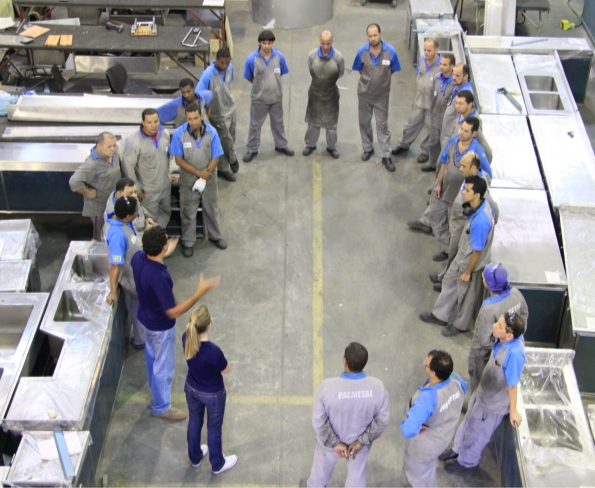The Benefits of an M&A Adviser
You, the business owner, are a risk taker that is accustomed to getting things done on
Read FurtherReady to sell your manufacturing business in Texas? We don’t blame you!
With a robust general and high-tech manufacturing sector, a large skilled workforce, and a favorable business climate, the manufacturing industry is a backbone of the Texas economy. A quality Texas-based manufacturing operation is always in demand.
Here’s what you need to know about how to sell a manufacturing company in Texas…
 The Texas manufacturing sector faces stiff competition from the global economy. As such, its bread-and-butter is innovation, technical advancement, and a commitment to quality — factors that can’t be imitated on the cheap abroad.
The Texas manufacturing sector faces stiff competition from the global economy. As such, its bread-and-butter is innovation, technical advancement, and a commitment to quality — factors that can’t be imitated on the cheap abroad.
The central location of Texas (not to mention the import-export hub of the Port of Houston and the bustling capital city of Austin) makes Texas an in-demand location for domestic manufacturing. So, for those wondering: Could it be tricky to sell my business in Houston? they might just be in luck.
To sell anything at its best price, we must understand what makes it valuable.
Here’s what can make a manufacturing business valuable when stacking it up next to similar organizations:
If the past few years have taught us anything, it’s the incredible value of an established, durable supply chain. A manufacturing company with a solid supply chain in place can be worth its weight in gold.
Not far behind an established supply chain in importance are your established relationships with trustworthy vendors and a streamlined process for collaboration. Entrepreneurs, competitors, and vertical integrators might pay top dollar to access a fleshed-out ecosystem of reliable vendor relationships.

Texas is known for its robust supply of skilled labor. Beyond that, an already-assembled skilled workforce is a major benefit to entice someone to buy an existing manufacturing company rather than build their own.
Additionally, training programs to hire, replace, and upskill members of the workforce makes an established manufacturing organization all the more valuable. With that, the loss of any given employee doesn’t represent a single point of failure.
All businesses derive some or all of their value from their ability to generate revenue — especially revenue in excess of expenses. The revenue your manufacturing company pulls can play a significant role in its valuation.
Manufacturing can’t exactly be done online. It generally requires real estate, equipment, and physical property. That property contributes to the value of the business (particularly if it comes pre-assembled in a functional package).
In addition to physical and real assets, patents, trademarks, and copyrights contribute to the value of the business. This can be extra meaningful if the intellectual property (IP) contributes to a company’s reputation, operations, and ability to outpace competitors.
Have you decided: OK, it’s time to sell my manufacturing business in Austin… or Houston… or any other amazing Texas city? Well, then, full steam ahead!
Keep reading for a basic prep guideline on how to sell a manufacturing company.
 Don’t merely guess at the value of a business. Overpricing a listing out the gate could cause a business to sit on the market for weeks, months, or even years without a credible offer.
Don’t merely guess at the value of a business. Overpricing a listing out the gate could cause a business to sit on the market for weeks, months, or even years without a credible offer.
When some buyers see a property languish on the market, the more it could look like a lemon to them. At that point, sadly, many business owners feel pressed to sell for less than market value.
It’s generally preferable to get a neutral opinion up-front from a business broker or valuation expert. That way, you can make your business as attractive as possible to qualified buyers without selling yourself short.
The financials of a company could make or break the sale. Start pulling them together in an organized, easy-to-read, standardized package.
Include as many years as possible of profit-and-loss statements, cash flow statements, and balance sheets with lists of assets and liabilities. Consider looking for deeds and bills of sale, contracts, bills, and tax returns. Legal documents to gather might be leases, patents, and trademarks.
Since manufacturing industries tend to have premises, it behooves you in the runup to the sale to make improvements. Try not to stress too much: You don’t have to turn your facility upside down. However, cleaning, tune-ups, maintenance, and addressing deferred maintenance can help make a company a more attractive commodity.
In addition to making your premises as appealing as possible, consider making operations as appealing as possible. Take this as an opportunity to trim away fat and make process improvements that have been on the backburner. It’s time to get your organization operating like a Swiss watch as much as possible.
Like anything for sale, it takes marketing to sell it. Marketing campaigns help ensure people are aware of the opportunity to buy your manufacturing business and why they might want to.
A key marketing tool for manufacturing businesses is a selling memorandum. This pamphlet, booklet, or eBook walks the reader through the particulars of your manufacturing business, usually accompanied by photographs and visual aids.
Selling memorandums might also include a pro forma financial analysis (though not an in-depth financial accounting — that’s what due diligence is for). The goal is to hype the business to the reader and get them excited to learn more.
The next step is getting the selling memorandum into the hands of potential buyers. This can be done through various professional networks, listing services, and online forums or marketplaces. Options may include “inbound marketing,” where you entice prospects to come to you, or “outbound marketing,” where you specifically go after certain buyers.
It’s not ideal to get far down the road with someone who turns out to be unserious about closing or unable to close. Either before or after an offer is made, it’s important to determine whether the buyer is qualified.
Qualifications to check on may include (but aren’t limited to):
The Texas Business Organizations Code governs the structure and legality of Texas-based business sales.
Manufacturing businesses, in particular, have to adhere to state environmental codes for emissions and waste disposal. Finally, the transition of employees and workforce must adhere to regulations set forth by the Texas Workforce Commission.
Capital gains taxes may apply to proceeds collected in excess of the taxable cost basis of the business. Transfer of personal property (equipment, inventory, etc.) is subject to state sales tax. A small Texas State Franchise Tax liability may be incurred with the sale of a manufacturing business.
Note that taxes may differ based on the Texas city you are in. For instance, if you sell a business in Austin, taxes look different than places like Oak Grove or Longview.
The Texas Manufacturing Extension Partnership (TMAC) is a non-governmental organization dedicated to the excellence of the Texas manufacturing sector. The TMAC doesn’t involve itself directly in the sales of manufacturing businesses, but it can help you with a successful sale. The Fort Worth-based company can help through consulting and suggesting best practices for operational improvement, workforce development, documentation, and systems.
Your manufacturing business will likely need to pass through several thresholds and over several hurdles on the way to the closing table:
You can sell your Texas manufacturing business without the help of a broker or advisor, but a business broker brings many advantages to the table. They may have access to a network of interested buyers, plus specialized experience in marketing a company.
Brokers can negotiate on your behalf and protect your confidentiality. These professionals can take much of the burden of due diligence and the sale process off your plate.
Many documents your buyer might want to see could be confidential and sensitive.
Such information might include:
You may be uncomfortable tipping your hand on those confidential documents, so ironclad confidentiality agreements are there to protect you.

The Letter of Intent (LOI) is an informal, non-binding offer to buy the business. It’s intentionally short and easy to understand, naming a price and sketching out terms. The LOI serves as the starting point of negotiation.
Once an LOI has been submitted, the parties can negotiate terms back and forth. After new terms are agreed upon, the prospective buyer submits a new LOI.
Often, the business broker or advisor negotiates for the business owner. When a business owner accepts an LOI, it represents an intent to go under contract for sale and begin the due diligence period.
The purchase agreement is the legally binding contract to purchase. As such, it’s usually crafted by attorneys and tends to be long and complicated. Once the purchase agreement is executed, the due diligence and contingency periods start.
Once a purchase agreement has been signed, the work really begins (particularly for the buyer). Most often, buyers have a set period to renegotiate or pull out of the purchase agreement if red flags arise in the due diligence.
Due diligence is the buyer’s limited-time chance to get elbow-deep in the business. They might comb through every financial document, inspect the premises from top to bottom, and inspect every piece of machinery.
Potential buyers may also wish to search legal records to check the business is properly licensed and that you, as the seller, actually own the business and have the right to sell it. In other words, it’s their chance to verify that the venture actually is what you say it is.
As the seller, your role is to help out, be transparent and available, and avoid throwing monkey wrenches into the works. This is not the moment to be adversarial. If the buyer doesn’t like what (s)he sees, the contract might fall through, and you’re back to square one.
How the buyer decides to finance the purchase can significantly impact the length of closing and the likelihood of closing. Bank financing and SBA loans tend to take a while to fund; all-cash or seller financing is often quicker. How the buyer intends to finance the deal (and their qualification to obtain that financing) can play a large role in deeming the buyer’s offer as acceptable.
Especially with manufacturing, you can expect many legally required disclosures and regulatory burdens, including compliance with the Texas Business Organizations Code and various environmental codes. Your attorneys and compliance specialists could have their work cut out for them.
Once the due diligence period is over, funds to close are wired to escrow, and the final documents can be signed to formalize the sale. Funds are disbursed, keys are handed over, and champagne corks can be popped — you’ve done something quite monumental!
Once the deal has closed, a comprehensive plan is created to hand over the keys to the premises to the new owner. Other access they might need could include a tech stack, digital back office, confidential documents, bank accounts, archives, and more. See if the organizational documents or stock records need to be updated (along with similar concerns).
A new chain of command may need to be established from the top down. Informing the team of changes in who to report to and what to expect can help this transition be more seamless. The new owners should be brought up to speed about the current state of operations and the current initiatives in play.
 After selling your manufacturing business, you may have some time on your hands. Don’t underestimate the impact on your personal life. Filling that time can be more challenging than you think. There are only so many beaches you can lounge on, after all!
After selling your manufacturing business, you may have some time on your hands. Don’t underestimate the impact on your personal life. Filling that time can be more challenging than you think. There are only so many beaches you can lounge on, after all!
Start thinking about the next act. Philanthropy? World travel? Self-improvement and enrichment? Family vacations? Legacy? A new entrepreneurial venture?
The sky's the limit!
Sources:
Franchise Tax | Texas Comptroller
Home | Texas Workforce Commission
Information on the Texas Business Organizations Code | Texas Secretary of State

Prior to purchasing IBEX, Chuck Harvey spent 35 years as CEO, CFO and consultant to the Fortune 500, Middle Market, Mainstreet and in the Start-up community, including spending time at PepsiCo & Price Waterhouse Coopers. During that time, Chuck oversaw three dozen buy-side / sell-side transactions on three continents, including a $35M sale of a Texas digital photography pioneer to a $1 Billion Japanese conglomerate.
Copyright: Business Brokerage Press, Inc.
“Texas Real Estate Commission Information About Brokerage Service”
“Texas Real Estate Commission Consumer Protection Notice.”
You, the business owner, are a risk taker that is accustomed to getting things done on
Read FurtherYou’ve found the buyer, negotiated a mutually rewarding deal, and are ready to close. Then it
Read FurtherEveryone asks, “What is my business worth?” An important question in determining whether you are ready to
Read Further